Table of Contents
Arabic is Grammatically Similar to European Languages… Kinda
Arabic does not belong to the European language family, but you’ d be forgiven for thinking it might. Now, I’m going to assume you have all studied at least one European language in the past, be it a Romance language, Germanic or Slavic. (And if your first attempt at learning a foreign language is Arabic, may God help you! … Oh wait, I’m supposed to be making the point that Arabic is easy here. Sorry.)
When you study Arabic, you’ll come across a lot of familiar concepts that you’ve seen while studying European languages: gender (masculine and feminine), cases (nominative, accusative, genitive), verb conjugations for various persons (I, you, he, she, etc.), the subjunctive mood, active and passive participles, just to name a few.
The similarities are relative of course, but if you were to compare Arabic to East Asian languages, what with their tones, honorifics, sentence-final particles, and reverse word order, you’d gain a new appreciation for how similar and easy Arabic really is.
Some of the similarities are quite remarkable, though still coincidental. Doesn’t the definite article الـ (al- / il-) remind you of the definite article in Romance languages (French le, Spanish el, Italian il)? In Spanish and Italian, the feminine is regularly formed by adding -a, as is the case in Arabic with ـة (-a).
Use your experience from your previous language learning ventures to help you make sense of Arabic grammar. Drawing comparisons can make everything seem more familiar and less daunting.
d be forgiven for thinking it might. Now, I’m going to assume you have all studied at least one European language in the past, be it a Romance language, Germanic or Slavic. (And if your first attempt at learning a foreign language is Arabic, may God help you! … Oh wait, I’m supposed to be making the point that Arabic is easy here. Sorry.)
When you study Arabic, you’ll come across a lot of familiar concepts that you’ve seen while studying European languages: gender (masculine and feminine), cases (nominative, accusative, genitive), verb conjugations for various persons (I, you, he, she, etc.), the subjunctive mood, active and passive participles, just to name a few.
The similarities are relative of course, but if you were to compare Arabic to East Asian languages, what with their tones, honorifics, sentence-final particles, and reverse word order, you’d gain a new appreciation for how similar and easy Arabic really is.
Some of the similarities are quite remarkable, though still coincidental. Doesn’t the definite article الـ (al- / il-) remind you of the definite article in Romance languages (French le, Spanish el, Italian il)? In Spanish and Italian, the feminine is regularly formed by adding -a, as is the case in Arabic with ـة (-a).
Use your experience from your previous language learning ventures to help you make sense of Arabic grammar. Drawing comparisons can make everything seem more familiar and less daunting. Cognatelessness
 Okay, that may not be a real word. But cognate is. A cognate is a word that has similarities to a word in another language because they share a common origin, even if the meanings have diverged. The Spanish word puerta (door) is a cognate of the English word port. The German schreiben (write) is a cognate of the English scribe.
Okay, that may not be a real word. But cognate is. A cognate is a word that has similarities to a word in another language because they share a common origin, even if the meanings have diverged. The Spanish word puerta (door) is a cognate of the English word port. The German schreiben (write) is a cognate of the English scribe.Roots are Radical!
 Or radicals. If you’ve studied Arabic for long, you know what I’m talking about. If you’re new to the language, and the concept of roots and radicals baffles you, never fear! I will be doing a full blog post on these sooner than later.
Or radicals. If you’ve studied Arabic for long, you know what I’m talking about. If you’re new to the language, and the concept of roots and radicals baffles you, never fear! I will be doing a full blog post on these sooner than later.
For now, suffice it to say that roots are generally three consonants (‘radicals’) from which Arabic words can be built:ك ت ب (k-t-b) embodies the concept of writing. That is, words built with it have something to do with writing.
- كتب (kataba) – to write
- كتاب (kitāb) – book
- مكتب (maktab) – office
- مكتبة (maktaba) – bookstore, library
It is a brilliant system and can help learners in two ways. Noticing the root in a new word will help you memorize it by making a logical connection to the concept it embodies and other words with the same root you already know. Likewise, this will help you guess the meaning of an unfamiliar word in context.
All Swiggles
 At least that’s what it looks like in the beginning. Arabic script is certainly beautiful, and Arabic calligraphy is a highly appreciated art. Still, learning a new alphabet is a definite challenge. It is time-consuming and takes away time from learning grammar, vocabulary, and building fluency. This all means that it will take a newbie more time to get off the ground in the language. So, it’s important to set small, manageable goals in your language learning in order to keep yourself motivated and on track.
At least that’s what it looks like in the beginning. Arabic script is certainly beautiful, and Arabic calligraphy is a highly appreciated art. Still, learning a new alphabet is a definite challenge. It is time-consuming and takes away time from learning grammar, vocabulary, and building fluency. This all means that it will take a newbie more time to get off the ground in the language. So, it’s important to set small, manageable goals in your language learning in order to keep yourself motivated and on track.
To make matters more complicated, short vowels are normally not written in Arabic. Likewise, double (geminate) consonants are not marked. Having knowledge of Arabic grammar and word patterns will help readers determine what the “missing” vowels are and which consonants are doubled. A و could represent either w or ww followed by a, i, or u, or even uu or aw. (Did I miss any?) Yikes! It is up for debate whether it’s better to tackle a language with an unfamiliar script by learning the writing system from the beginning, or to put it off while using a system of phonetic transliteration, that is, using a writing system based on the Latin alphabet to show the pronunciation. I personally have some strong feelings about this topic, which I will share in a later post.
Arabic is Everywhere
 With over 400 million speakers, Arabic is the fifth most common language in the world. It is the official language of 22 countries and is one of the six official languages of the United Nations. This all makes Arabic a very useful and important language.
With over 400 million speakers, Arabic is the fifth most common language in the world. It is the official language of 22 countries and is one of the six official languages of the United Nations. This all makes Arabic a very useful and important language.
And for you, as a learner, this is a great advantage. Resources to practice Arabic and opportunities to use Arabic are plentiful. There are all kinds of websites dedicated to teaching Arabic and many others meant for native speakers of Arabic but which provide excellent learning materials for intermediate and advanced learners. I’ll be recommending my favorite web resources in future posts. And the same is true of books. As the interest in Arabic grows, so does the number of quality learning materials available. That’s been my inspiration in producing materials for Lingualism: to fill the gap in the market for quality learning materials for Arabic learners, especially for intermediate learners and those who are interested in Egyptian Colloquial Arabic and other dialects.
Arabs are everywhere, too. With 400 million of them, there are likely a few in your community. Don’t be shy. Generally known for their hospitality and warmth, they’ll surely be flattered you’re learning their language and are showing curiosity for Arab culture. Worst case, you get a couple of minutes of practice talking to a native speaker. And who knows, you may make a new friend!
Difficult Sounds
 Whenever you set about to learn a new language, you will have to deal with unfamiliar phonemes (sounds) that you’ll have to learn. This might be rolling your R’s in Spanish, or rounding your lips and positioning your tongue just right to produce the German ü.
Whenever you set about to learn a new language, you will have to deal with unfamiliar phonemes (sounds) that you’ll have to learn. This might be rolling your R’s in Spanish, or rounding your lips and positioning your tongue just right to produce the German ü.
When it comes to Arabic, we’re mostly off the hook for vowels. There aren’t many different vowel sounds in Arabic, and they’re mostly very similar to those we have in English.
But the consonants. Oh my God, the consonants. Okay, most of them are easy enough, virtually identical to sounds used in English. But there is a series of more challenging sounds that require some fancy work toward the back of your mouth and throat and/or with tongue positioning. The culprits are:
ح خ ص ض ط ظ ع غ ق
The first time I ever sat down to learn Arabic, I actually got a sore throat. A Libyan friend was trying to help me practice making ق correctly. Maybe I pulled my “glottis muscle”–is that a thing?– Anyhow, I actually physically hurt myself… a little. I remember thinking, “This is ridiculous. This language is impossible.” And I didn’t have the courage to approach Arabic for another several years. Don’t let my anecdote scare you off though, newbies. Whatever seems impossible now, I assure you, is not. With patience and practice, whatever you’re studying will become second nature and seem easy in retrospect.
Do keep in mind that pronunciation is important, but unfortunately often undervalued by learners. Being lazy and thinking, “Well, ق q just sounds enough like ك k to me. I’ll just say k.” is a mistake. These are two separate phonemes and Arabic, which means they sound like two completely different sounds to native speakers’ ears. You’ll be misunderstood. Also, the longer you do something wrong, the more fossilized (harder to change later) it becomes. Take the time to get it right.
Arabic is Affordable
 I don’t know if all languages were created equal, but they certainly aren’t all equally priced when it comes to instruction from native speakers.
I don’t know if all languages were created equal, but they certainly aren’t all equally priced when it comes to instruction from native speakers.
Of course, this has to do with the local cost of living and, correspondingly, local wages. Obviously, spending a year studying in, say, Germany or Japan is going to cost you more than a year (or even two!) in Egypt or Morocco. And you can still take advantage of this affordability without leaving home, thanks to Skype tutoring. If you haven’t tried it, I highly recommend it. You can get in your much-needed speaking and listening practice by practicing with a native speaker, and without even having to leave the house. The convenience factor makes it easier to find the time and stick with it long term.
Rates will vary depending on a teacher’s qualifications and experience but tend to be around $10 an hour. You can sometimes find even cheaper hourly rates by buying long-term packages or subscriptions. You can either ask that your teacher guide you in your learning, planning lessons, and providing materials for study. Or you can specify that you are studying on your own and just need speaking practice.
I have personally used three websites for Skype lessons in the past, which I would happily recommend:
Diglossia
 I hate to end this post with more bad news… and this one’s a kicker. But here it goes: There is not one Arabic language. There are many. The reason we tend to think of all the varieties of Arabic as one language is rooted in politics, religion, and cultural identity. From a linguistic standpoint, some dialects of Arabic should be considered separate languages, as they are mutually unintelligible, and differ from each other as much as French and Spanish do from each other.
I hate to end this post with more bad news… and this one’s a kicker. But here it goes: There is not one Arabic language. There are many. The reason we tend to think of all the varieties of Arabic as one language is rooted in politics, religion, and cultural identity. From a linguistic standpoint, some dialects of Arabic should be considered separate languages, as they are mutually unintelligible, and differ from each other as much as French and Spanish do from each other.
Belgians like to see themselves as culturally distinct from the Dutch, so in Belgium, they speak Flemish, and not Dutch. (They’re actually the same language, no more different than British English is from American English.) For that matter, (and forgive me, my Dutch friends), Dutch is no more different from Hochdeutsch (standard German) than some dialects of German are. On the other hand, Cantonese is considered a dialect of Chinese. But if southeastern China were a separate country, surely Cantonese would be considered a separate language. After all, no one from Beijing could understand a word of it. Now, in China, the standard language, used on TV and in writing, is Mandarin, the dialect spoken in the capital. Chinese children all over China, whatever their mother “dialect” may be, learn Mandarin at school.
The difference between Mandarin (standard Chinese) and Modern Standard Arabic (MSA) is that Mandarin is the native dialect of hundreds of millions of people. MSA is the mother language of no one. That’s right. Every Arab speaks his or her native dialect first and foremost and learns MSA at school. MSA differs from spoken dialects, as it is based on the variety of Arabic used in the Quran, 1600 years ago. I’m going to draw a comparison, which might be a bit controversial, but I believe it’s spot-on and helps in understanding the linguistic situation in the Arab world:
Imagine that the people of Portugal, Spain, France, Italy, and Romania had a weaker sense of national identity and preferred to think of themselves first and foremost as Latins, descendants of the Roman empire. Imagine they viewed Portuguese, Spanish, and so on, as dialects of Latin, rather than individual languages. These dialects are corruptions of the real and pure language, Latin, and are therefore unworthy of being written or used for anything important. Latin is taught at schools. All newspapers, all books, all writing is done in Latin. Now, imagine studying Latin and then going to Spain and trying to communicate with the locals in Latin.
That is, more or less, the situation in the Arab world today. The point I’m trying to make is that the variety that exists in Arabic is often downplayed. Modern Standard Arabic has long been what learners of Arabic focus on, mainly because that’s what schools and universities have been teaching. Attitudes are slowly changing, and students are learning the value of studying the spoken language, the dialects. It really depends on your goals and reasons for studying Arabic. If you want to read the Quran, focus on Classical Arabic. If you are mainly interested in reading literature and news, focus on Modern Standard Arabic. If you want to talk to people, learn the language they actually use.


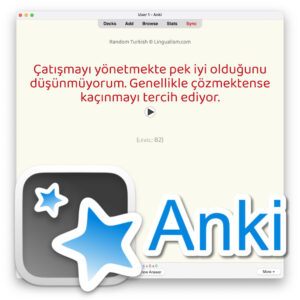
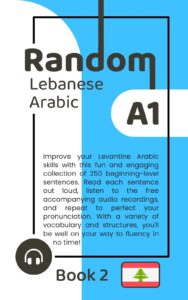
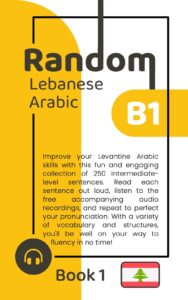
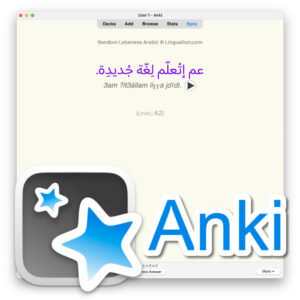
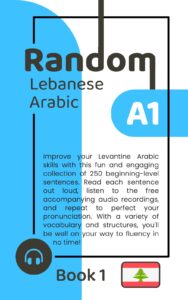

I’m using your Arabic Voices books and have benefited greatly from them. My focus is on MSA currently. I’m enjoying my studies and feel achieved when I manage to get through a news article or something similar. Nonetheless I am aware of the differences between spoken and written arabic.
I’m curious now, did you also start with MSA? I could not imagine learning “only” a dialect, especially not starting out with it. Did you find it very difficult to acquire a dialect? I would prefer learning a dialect abroad, where the dialect is spoken, rather than sitting at home. Especially because there are schools teaching the colloquial language now!
I don’t think learning a dialect is a problem if you have the right mindset and plan your studies carefully. I just hear “horror stories” from people who studied MSA for 5 years, but never cared to step into the arabic speaking world and gain experience. I think many people are ignorant about it and end up being disappointed. I believe the key is to spend a good amount of time on both to reach a professional level.
I’m glad you find the Arabic Voices books useful.
Yes, I started with MSA, and after reaching a lower-intermediate level, I started learning ECA, as well. There’s a lot of debate about whether it’s best to start with MSA or a dialect. Either way, I think it’s important to study both eventually. They both serve their own purposes, reading and speaking, respectively.
The advantage MSA has over ECA is that there are plenty of things to read in MSA; after all, dialects aren’t widely written. But I think the dialects are definitely easier than MSA. MSA has comparatively complex grammar, with all the case endings (إعراب) and what not. The feel in the classroom is quite different too. For MSA, it’s usually a lot of grammar, reading, and translation. Feels like a Latin class! And for ECA it’s much more conversational, of course.
You are right, and I am also looking forward to delving into a dialect and spending more time with it. But I have the feeling it would be better to reach a higher lever with what I have started, before starting another project. I’m also trying to gather materials in levantine, specifically syrian Arabic. Are you still planning to release a levantine dictionary or other materials?
By the way, the blog is really impressive. Love the colloquial lessons including the audio. It’s an incredible recource!
Thank you for this very interesting and honest article, Matthew. I wish I could have read such an insightful and useful article before I got started learning some Arabic years ago. You make very clear the difference between MSA and dialects and the purpose for studying either one or both as well. As for me, I started learning Arabic with my favorite “method” which is ASSIMIL (I have learned several languages with it and I think I could reach almost an intermediate level through the process in each). The title of the book I used was L’ arabe sans peine from Jean-Jacques Schmidt Volume 1 and 2 published in 1975 and last year I could study from L’ arabe by Dominique Halbout by the same publisher. The first one was more conversational and situational while the second one allows for a more academic approach (answering all my questions). Both are excellent books to learn from (with the K7 or CDs), but I consider myself a beginner despite all this intensive study. I own plenty of other books to learn MSA but I think Matthew’s material for studying dialects is outstanding too. So in the next decade, I will dedicate some time regularly – I am retired – and try to get to a decent level of comprehension and hopefully be able to utter a few sentences in the Egyptian, Levantine and Maghreb dialects. My main problem (apart from old age, of course) is the difficulty to read texts without the short vowels; hence my difficulty to follow along a text when it is spoken or read rapidly, apart from not knowing the words. You almost need a photographic memory to do so successfully. I suppose that this will be overcome with a lot of regular practice, but still, sometimes it comes to a point that I consider Arabic more difficult to read than Chinese (of course, I am not talking here about the pronunciation for the latter). Right now, I devote my time to Turkish on a daily basis but I promise myself to go back studying Arabic seriously in a few weeks. As soon as I get the money (and time), I would like to buy Matthew’s bundles as there are so many useful tools in them. I will continue to explore this web site which looks promising. Turkısh people would say İyi çalışmalar! and Kolay gelsin! In Arabıc I also read that Inna Allaha ma’a as-sàbirìna (God is on the side of the patient) and that Aȿ-ȿabrou miftàẖou (a)l-faraji. Patience is the key to relief/release) and also Chaعratan fa-chaعratan taعmalou liẖyatan Hair by hair you make a beard (Petit à petit, l’oiseau fait son nid).
I’m glad you found the article interesting, Jacques. I remember seeing the ASSIMIL series when I was living in Turkey. Thank you for sharing about your language learning journey.
Learning a language takes lots of exposure to the language, so I would recommend you do more listening and reading (and mimicking) than studying course books at your level. Our materials contain diacritics (short vowels) to make reading easier. We do have our own system, which omits fatha etc. You can find our orthographic system in Blog → Egyptian → Grammar.
You might be interested to know, I’m currently working on a version of my book Egyptian Colloquial Arabic Vocabulary for Turkish speakers, so it will contain Egyptian Arabic – Turkish vocabulary lists.
Glad to know about that. Thank you.